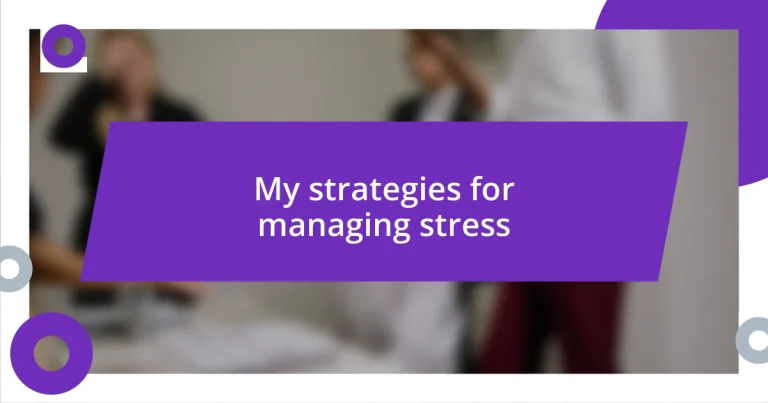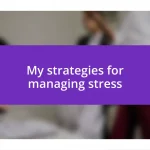Key takeaways:
- Identifying personal stressors, such as work pressures and relationship dynamics, is essential for effective stress management.
- Developing coping strategies like mindfulness, physical activity, and social connections can significantly alleviate stress levels.
- Regularly evaluating and adjusting stress management techniques based on personal reflections helps maintain progress and encourages new methods.
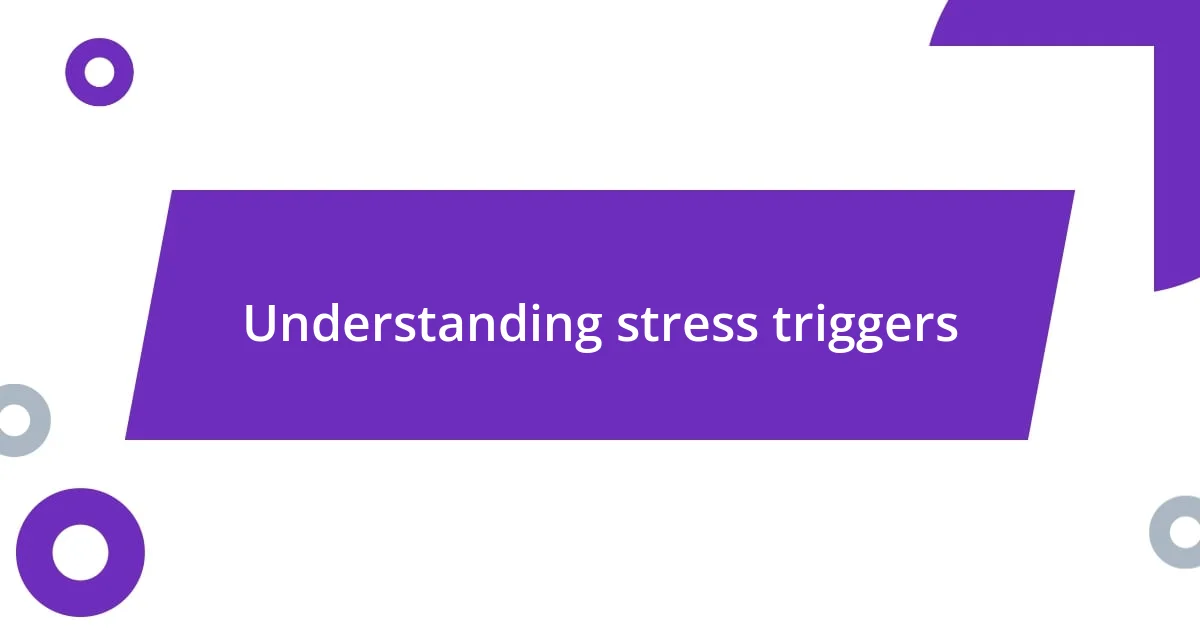
Understanding stress triggers
Understanding stress triggers requires a closer look at the situations and emotions that often creep up on us. For instance, I remember a time when work deadlines started to pile up, and I noticed how my heart raced at the mere thought of starting a new project. Do you ever feel that same clenching sensation in your chest when pressure mounts?
Certain stressors tend to be more common than others—like financial worries, relationship issues, or even a demanding work environment. When I began to identify these common triggers in my own life, it was like lifting a fog that clouded my ability to cope. It made me realize just how impactful small changes could be; even a simple shift in perspective could alleviate a great deal of my stress.
I’ve found that understanding my triggers allows me to prepare for them. For example, I know that crowded places can overwhelm me, so I always try to carve out some quiet time before or after such events. How do you manage your stressors? Reflecting on this can open the door to discovering healthier coping mechanisms.
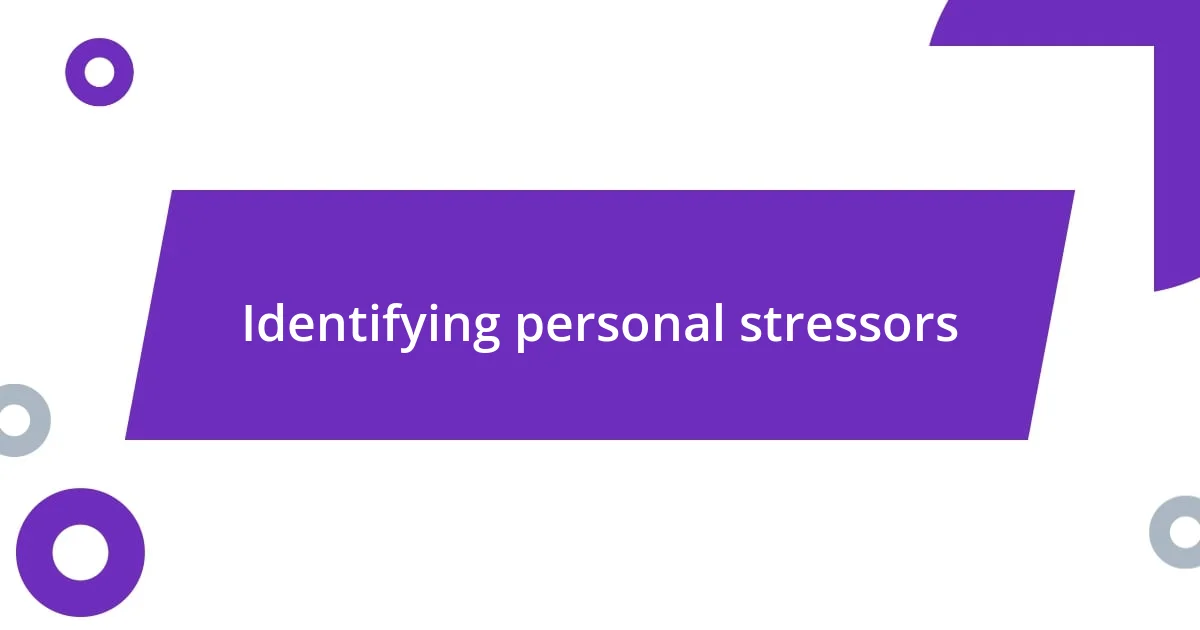
Identifying personal stressors
Identifying personal stressors is a key step in managing stress effectively. I remember a time when I had to carry the weight of family obligations alongside my job. It was during that period I realized that my stress often peaked when I was juggling too many commitments. Tuning into my emotions helped me recognize that when I overextended myself, I felt anxious and drained.
To get a clearer picture of your stressors, consider these common categories:
– Work-related pressures: Deadlines, workload, or conflicts with colleagues.
– Financial concerns: Money issues can gnaw at your peace of mind.
– Relationship dynamics: Tensions in personal connections can weigh heavily.
– Health and wellness: Physical ailments or self-image issues can contribute to stress.
– Environmental triggers: Things like noise or too much clutter can create stress.
By reflecting on these areas, I found that journaling about my feelings not only helped me pinpoint what stresses me but also provided clarity on possible solutions. What about you? Taking time to explore your stressors could unveil paths to more manageable living.
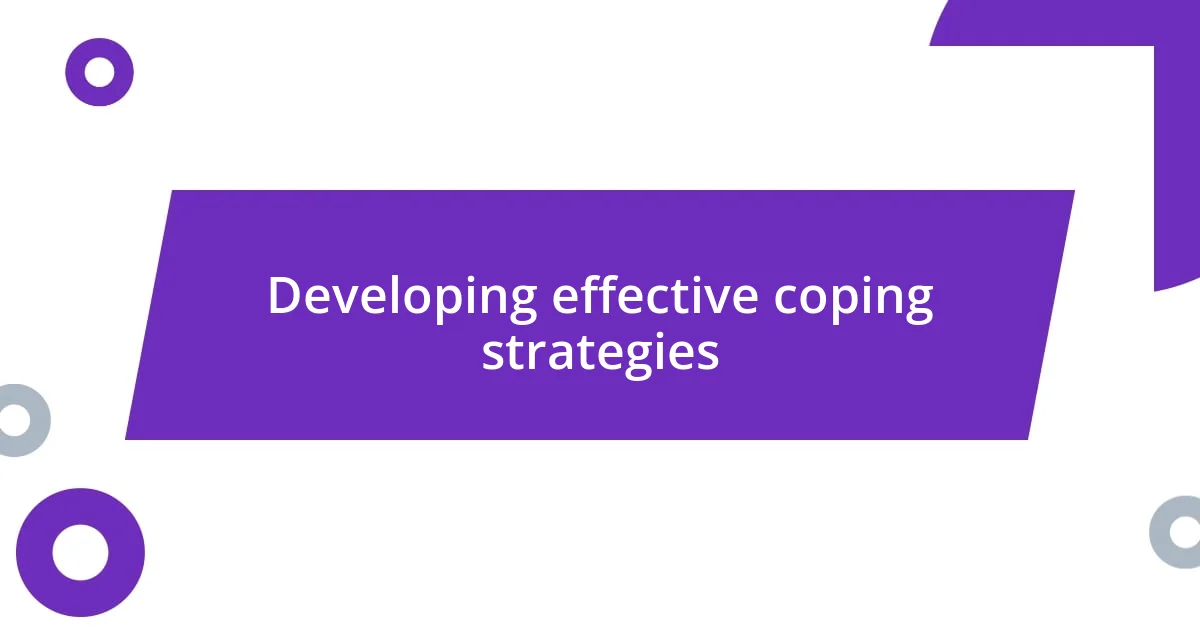
Developing effective coping strategies
Developing effective coping strategies can often feel like navigating a maze, but I’ve found that having a toolkit of methods really makes a difference. One strategy that resonates with me is mindfulness. I recall when I first tried meditation; I felt that initial skepticism. Yet, over time, dedicating just a few quiet moments each day helped clear my mind and reduce that overwhelming sense of chaos. Have you ever noticed how simply focusing on your breath can pull you back to the present?
Another approach is physical activity. I vividly remember a grueling week at work filled with tension; I decided to hit the gym more consistently. It was remarkable how those workouts not only released pent-up energy but also boosted my mood. Exercise doesn’t have to be vigorous; even a brisk walk outdoors can soothe my mind. What do you enjoy doing to stay active? Finding movement that you love can transform your outlook.
I also lean on my social connections as a vital coping resource. There was a time when I felt isolated amid stress. Reaching out to friends brought a sense of community and understanding that I desperately needed. Whether it’s sharing a laugh or a heartfelt conversation, those connections foster resilience. How do your relationships support you? Building a support system is essential; it not only provides a sounding board but also reminds us that we’re not alone in our struggles.
| Coping Strategy | My Experience |
|---|---|
| Mindfulness | Initially skeptical, but daily meditation brought clarity and calm. |
| Physical Activity | Regular workouts helped channel stress and boost my mood tremendously. |
| Social Connections | Reaching out to friends fostered resilience and a sense of community during tough times. |
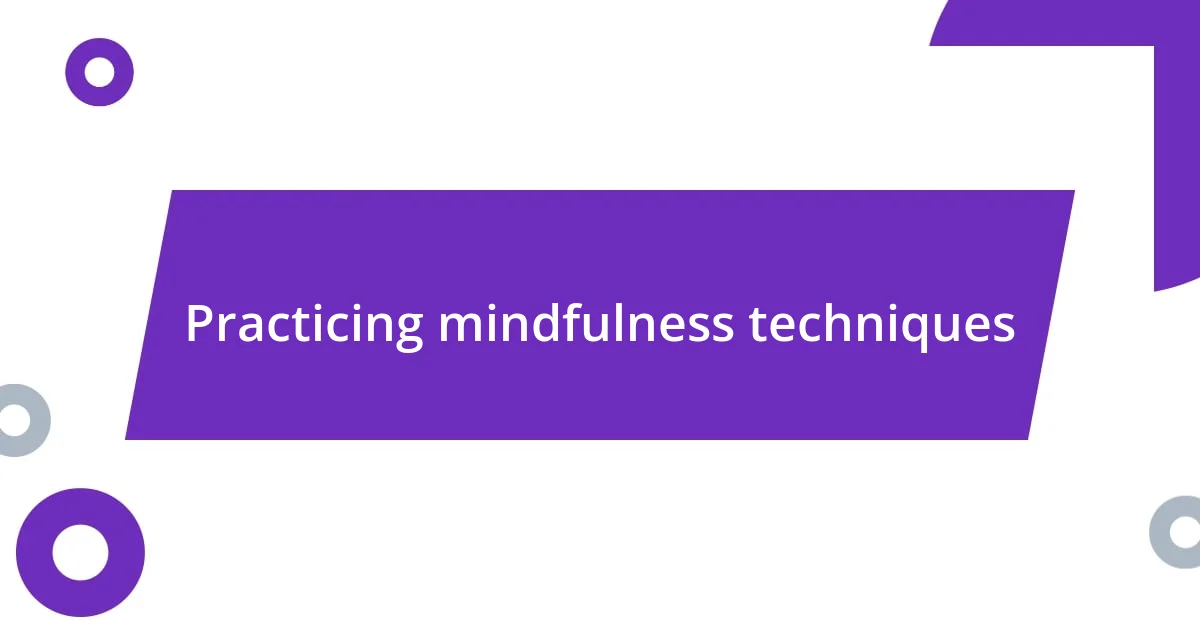
Practicing mindfulness techniques
Mindfulness techniques have transformed my approach to stress management. I often practice grounding exercises when I feel overwhelmed. One particularly effective method is noticing my surroundings by focusing on details—the colors, textures, and sounds. It’s fascinating how drawing attention to the present can pull me back from spiraling thoughts. Have you ever tried this simple act? It can be remarkably soothing.
Meditation is another mindfulness practice I cherish. I remember vividly those early days of meditation, where sitting in silence felt like an epic challenge. Over time, however, I learned to embrace those moments of stillness. I began with just five minutes each morning. Gradually, those moments turned into a refuge, building resilience against daily stressors. How might dedicating just a few minutes to quieting your mind transform your day?
Breathwork is a technique I rely on during particularly hectic times. I once found myself in a high-stakes meeting, nerves bubbling up like a volcano. By taking a moment to breathe deeply, I felt that rush of tension ease. There’s something powerful about controlling your breath—it’s like holding a secret control for your mind and body. Have you considered how something as simple as breathing can shift your stress levels? It’s truly an empowering realization.
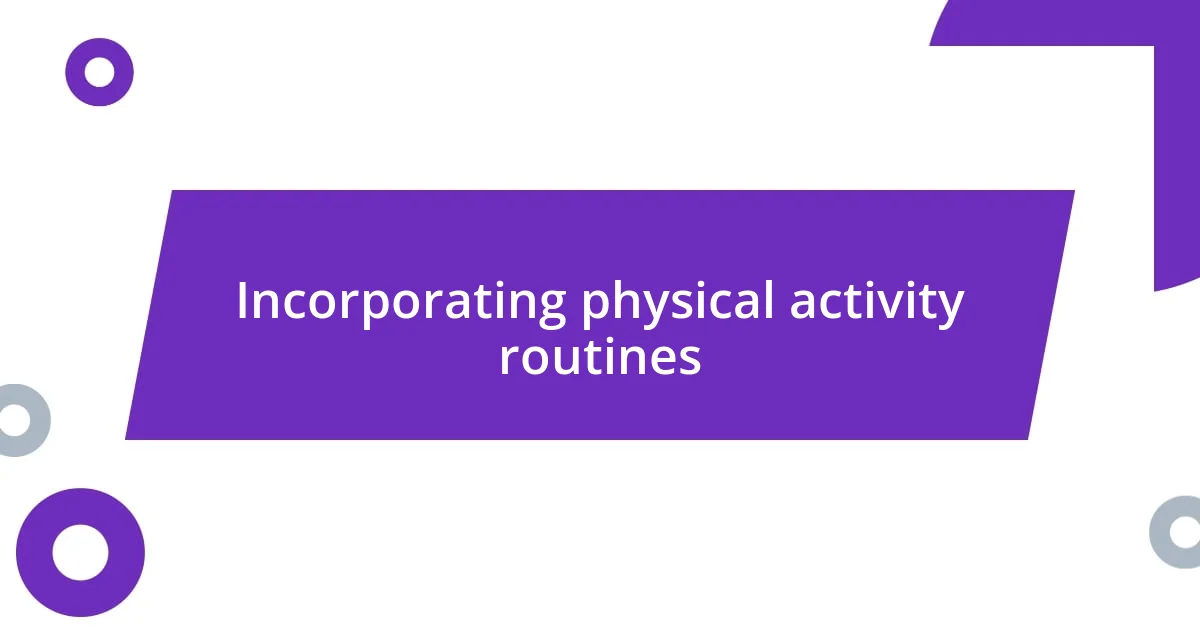
Incorporating physical activity routines
Incorporating physical activity into my daily routine has been a game-changer for managing stress. I remember one particularly overwhelming day at work when simply stepping outside for a quick jog around the block cleared my head like nothing else. It’s amazing how movement can shift our mindset almost instantly—have you ever felt that rush of clarity after a good sweat?
I’ve also found joy in mixing things up with different activities. One week, I took up yoga, which surprisingly blended physical exertion with a calming focus on breath. Initially, I struggled to find my balance, but each session felt like pulling together scattered pieces of my mind. Isn’t it rewarding to discover new ways to connect body and mind?
Even on days when I’m crunched for time, I make it a point to include short bursts of physical activity, like a five-minute dance break in my living room. This playful approach not only elevates my mood but also reminds me that stress doesn’t have to dominate my life. What small changes could you make to fit movement into your day? Even the smallest steps can lead to significant changes in how we feel.
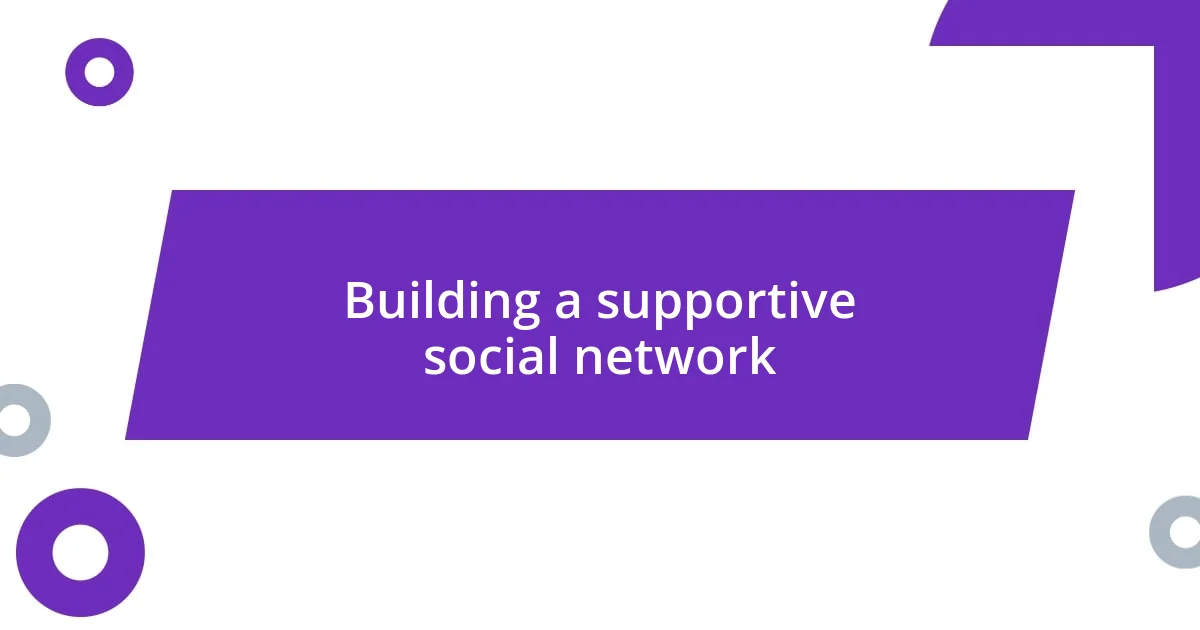
Building a supportive social network
Building a supportive social network has been essential in my journey to manage stress effectively. I vividly remember a time when I was juggling multiple responsibilities and felt the weight of the world on my shoulders. It was a close friend who simply checked in on me, offering a listening ear and compassionate advice. That moment reminded me how powerful it is to have someone in your corner. Have you ever felt instantly relieved just by having a friend to confide in?
Friendships provide a vital buffer against stress. There are many times when I’ve joined a casual coffee chat with colleagues, and the shared laughter offered a much-needed break from deadlines. It’s amazing how uplifting and energizing these small interactions can be, serving as a reminder that we’re all navigating life’s challenges together. Have you reached out to someone just to share a laugh or even vent about a tough day? Those moments can truly lighten our load.
Building this social network requires effort but pays off immensely. I’ve learned to surround myself with positive influences, like engaging in community activities or joining clubs that resonate with my interests. I once participated in a local book club not only to indulge my passion for reading but also to meet new people. It was through sharing thoughts and perspectives with others that I found solace and a sense of belonging. How might connecting with others around shared interests enrich your life? The beauty lies in knowing that we don’t have to go through stress alone—it’s about finding those connections that make the journey lighter.
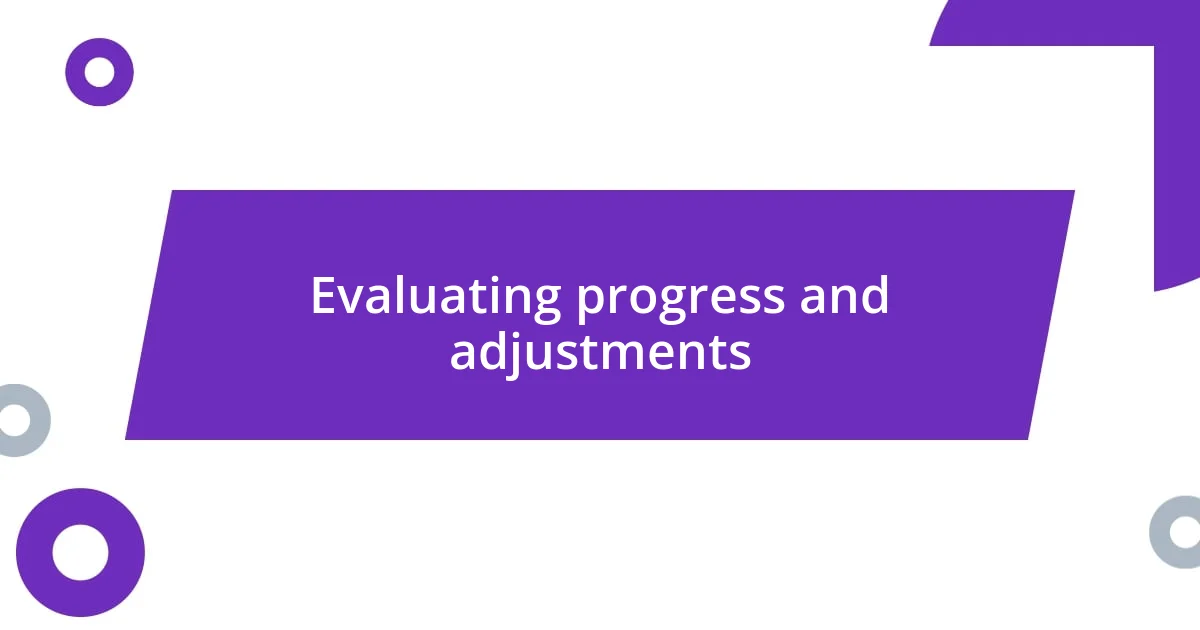
Evaluating progress and adjustments
Evaluating progress in managing stress is a crucial part of the journey. I recall a period when I dedicated a month to tracking my daily stress levels in a journal. At first, it felt tedious, but as I reviewed my entries, patterns emerged. I was surprised to discover that my stress often spiked in the afternoons after long meetings. Have you ever noticed certain triggers in your daily routine?
It’s essential to make adjustments based on those reflections. For example, recognizing my afternoon slump led me to incorporate short walks during breaks. Those brief moments of fresh air transformed my focus and reduced my stress levels significantly. How do you adapt your routine based on what you learn about yourself?
I also periodically reassess my stress management strategies to keep things fresh. There was a time when I found solace in meditation, but it waned in effectiveness. Knowing this, I explored new mindfulness practices, like guided imagery, which reignited my engagement. What methods have you found to be effective, and are there new approaches you could explore? Keeping an open mind can lead to remarkable transformations on your path to managing stress.












